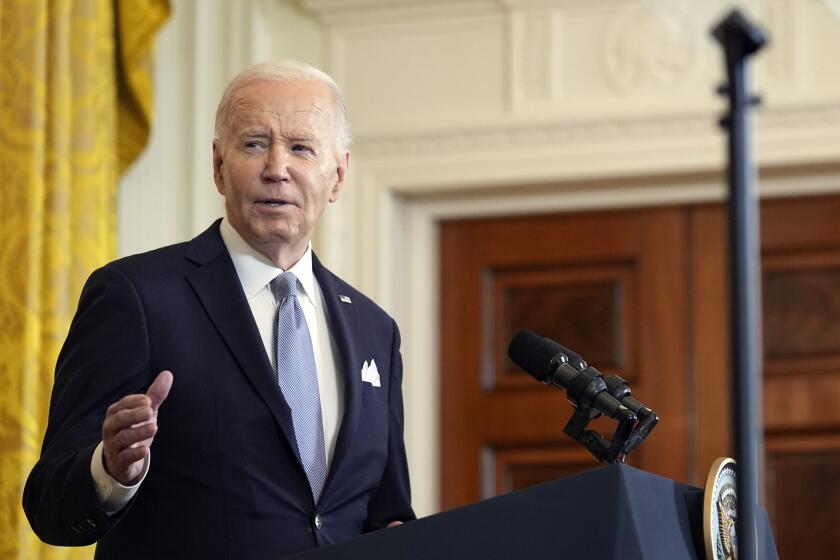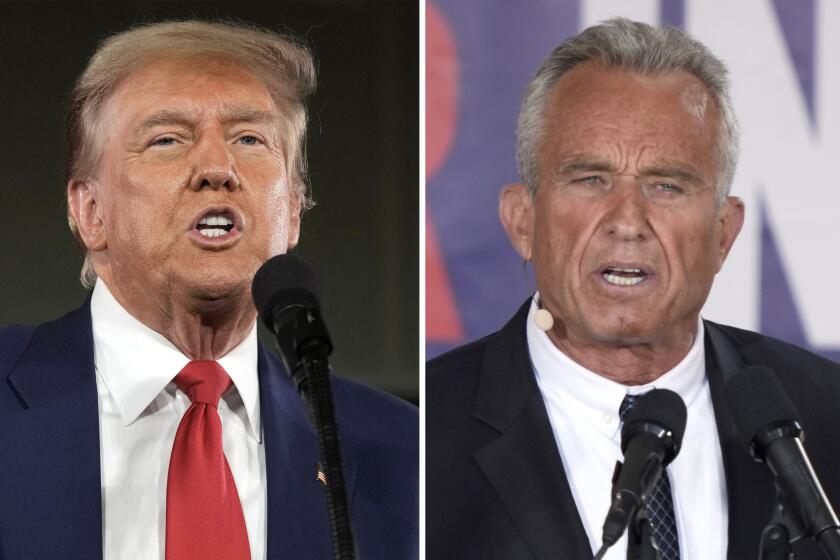King Marchers Stress Need for Economic Gains
Thousands of marchers from across the land gathered Saturday at the foot of the Lincoln Memorial to re-enact Dr. Martin Luther King Jr.’s historic March on Washington 25 years ago this weekend and to stress the need for more jobs and better economic opportunities for women, blacks and Latinos.
Contrasted with the 250,000 people who took part in King’s historic 1963 march, and with another huge throng that celebrated the 20th anniversary here five years ago, Saturday’s crowd under a broiling sun was smaller and younger and included many more whites. U.S. Park Police estimated the turnout at 55,000.
Speaker after speaker stressed the need to keep alive King’s dream of racial equality and social justice, a reference to the slain civil rights leader’s “I Have a Dream” speech that deeply moved the Aug. 28, 1963, gathering, the largest civil rights demonstration in U.S. history.
Dukakis Is Central Speaker
Democratic presidential candidate Michael S. Dukakis, the rally’s central speaker, set the tone by telling the crowd: “I see many young people who were too young to remember the events of 1963 but who understand very well the spirit that brings us here today.
“We must march not just so that some of us can reach the top of the hill,” Dukakis said. “We must march until every American has reached the bright sunshine of opportunity . . . until racism and anti-Semitism and discrimination of all kinds are banished from this land.
“We must march not just so that black children and white children can go to school together; we must march until all our schools are good schools.”
Contrasted with his performances during several recent speeches that had seemed flat and uninspired, Dukakis’ talk Saturday was enthusiastic and was warmly cheered and frequently applauded.
At about midday, arm in arm with longtime civil rights leaders Coretta Scott King and the Rev. Jesse Jackson, whom Dukakis bested for the Democratic nomination, the Massachusetts governor and his wife, Kitty, helped lead marchers along the grassy Mall from the Washington Monument to the white marble steps of the Lincoln Memorial for nearly four hours of speeches and songs.
Dukakis paid special tribute to Jackson, who was a longtime associate of King’s. “Dr. King today must be very proud of Jesse Jackson,” he said to prolonged applause.
Marchers Carry Signs
The marchers, many of whom were dressed in shorts and sneakers, carried signs reading, “We Shall Overcome” and “ERA Yes,” as well as placards espousing the causes of the homeless and disabled. There were signs shaped as peace symbols and large photographs of King. Although predominantly young, the crowd included elderly men with lawn chairs and some elderly women in pale dresses with white hats to protect them from the sun. Temperatures hovered in the low 90s.
The crowd spread out on the grass in front of the memorial and along the edges of the Reflecting Pool, where many dangled their feet in the water. Leaders said the marchers had come by bus, automobile, plane or train from every state.
Some in the crowd said they were attending to express hope that racial relations are improving. Others said they felt American society is still racist.
“A lot remains to be done,” said Alton Wallace, 35, who also attended the anniversary program five years ago.
‘Problems Are Deeper’
“The kinds of things the first wave of the movement accomplished were mostly surface things--the worst injustices,” he said. “The problems that remain are rooted much deeper and are much harder to solve.”
Vice President George Bush, Dukakis’ Republican opponent, declined an invitation to address the rally, campaigning instead in Texas. Jackson drew applause and laughter when he said: “George Bush is not in Washington today. And he must not be here on Inauguration Day next January.”
Bush’s campaign headquarters released a two-page statement, however, in which the vice president pledged his support for the marchers, saying: “I support you in your efforts to make the dream become a reality. . . . Opportunity for black America is growing.”
In a separate statement from California, where he is vacationing, President Reagan said:
“America has made vast progress toward fully achieving Dr. King’s dream of a color-blind society. . . . On this anniversary, it is fitting that all Americans should give thanks for that progress and for the work of those who sacrificed so much to bring it about.”
Statements Not Read
Neither the Bush nor the Reagan statement was read to the crowd.
When Dukakis finished speaking, the crowd broke into loud chants of “Where Is George?”--picking up the “Where Was George?” refrain used by delegates to deride Bush at the Democratic National Convention in Atlanta.
Jackson did not mention Dukakis but attacked Bush and Reagan for trying “to return us to an old fortress . . . to rebuild old walls (and) to crush the dream.”
“One day now, not long from now,” Jackson said, “we’ll commemorate this day, and we’ll be at the White House. We’ll sit around the brotherly table one day. . . . Keep your hopes high. We’re too close to where we’re going, we’re too far from where we started. Hold on now. Don’t you surrender, my friends. . . . Keep hope alive.”
“Dr. King was not a dreamer, he was a fighter,” Jackson said. “We’re not here today to dream. We’re here to redeem the promise of economic opportunity . . . of better education and a national health plan.”
Reminded of Issues
Jackson and Benjamin L. Hooks, the longtime executive director of the NAACP, both reminded the crowd that the struggle 25 years ago was for voting rights and for equal access to public accommodations. The demonstration that year helped pave the way for passage of the landmark 1964 Civil Rights Act and the 1965 Voting Rights Act.
“Yesterday we marched for the right to buy the hot dog,” Hooks said. “Today we seek not only to buy the hot dog, but to sell the hot dog and to manufacture the hot dog.”
Mrs. King, who appeared at the podium with her four grown children, said her husband’s dream will not be realized until “women fully occupy every level of government, of business and the social order equal to their numbers in the general population.”
Staff writer David Lauter contributed to this story.
More to Read
Get the L.A. Times Politics newsletter
Deeply reported insights into legislation, politics and policy from Sacramento, Washington and beyond. In your inbox three times per week.
You may occasionally receive promotional content from the Los Angeles Times.






